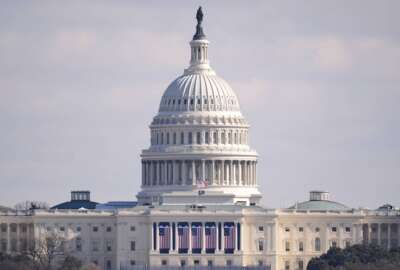Alternative energy key to DoD’s battlefield strategy
The Department of Defense is looking to utilize alternative fuel sources in order to respond to changing operational energy needs on the battlefield.
wfedstaff | April 17, 2015 5:10 pm
By Melissa Dawkins
Special to Federal News Radio
The Defense Department is adopting new methods to fuel the new technologies it’s sending into the battlefield, according to Sharon Burke, assistant secretary of Defense for operational energy plans and programs.
“It’s amazing to think about what kind of capability just an individual on the battlefield has that they didn’t have five years ago; three years ago,” Burke said in an interview on In Depth with Francis Rose. “It all requires batteries and fuel. So, our fuel demand and our battery demand have gone up astronomically. So that’s one thing that’s different. So we have to change the way we do business.”
DoD’s operational energy demand in fiscal year 2007 was 117.2 billion barrels of fuel at a cost of $11 billion, while demand in 2011 grew to 114 billion barrels with a $16.8 billion price tag, according to a DoD report released in March.
Changing the way DoD does business means relying more on renewable energy, while decreasing dependence on traditional fuels that must be transported through sometimes dangerous routes, Burke said. She added changes in operational tactics have made energy security and efficiency even more important in recent years.
“There is no front line to stay behind. Everything’s on the battlefield. And [the fuel] is targeted by our adversaries,” Burke said. “These are things that have changed, so we have to change too. Better energy security is one of the ways to change.”
Burke said looking into solar energy use in Afghanistan, for example, can decrease dependence on ground and air transport for fuel supply, while ensuring bases have access to needed energy.
“Those folks in the remote locations really need their fuel. They can’t operate without it. We’ve been looking at the role of solar in cutting their fuel demands so that they can run their computers and their communication gear without relying on that supply line,” Burke said. “So that’s a diversification that’s being driven by a military need.”
Burke’s office, the Office of the Assistant Secretary of Defense for Operational Energy, was established in 2010 to better manage DoD operational energy, or “the energy required to train, move, and sustain forces, weapons, and equipment for military operations,” as opposed to installation energy which is used to power non-tactical vehicles and buildings.
In 2011, DoD consumed roughly 80 percent, or 890.3 trillion BTUs, of the total energy used by the federal government, according to a Department of Energy report. About 75 percent of the total DoD energy budget is operational energy, according to the Congressional Research Service.
Though alternative energy use is increasing, the military will continue to depend heavily on petroleum.
“We do expect that we will continue to be a very petroleum-dependent force. Petroleum has an energy density and a universal availability that’s very, very important for a military force,” Burke said. “…We have equipment in our arsenals that’s designed to use liquid fuels that are going to be around for many decades.”
But because energy diversity guidelines were added into the requirements and acquisition processes, Burke said she anticipates an increase in the implementation of tactical solar panels, fuel cells, flywheels, more efficient batteries and other energy-saving measures and practices in the future.
“The real challenge for us is what does the Department of Defense need? What do our armed forces need to be able to do?” Burke said. “And what are the innovations that are going to help them do it better, do it differently, do it at greater distance?”
Melissa Dawkins is an intern for Federal News Radio.
RELATED STORIES:
” target=”_blank”>DoD initiative will save fuel, improve security
Want to stay up to date with the latest federal news and information from all your devices? Download the revamped Federal News Network app
Copyright © 2025 Federal News Network. All rights reserved. This website is not intended for users located within the European Economic Area.





